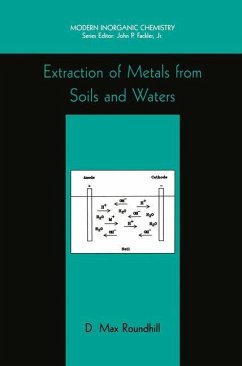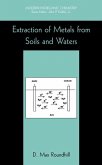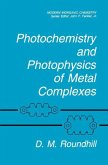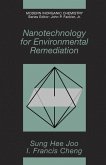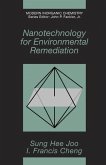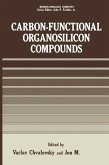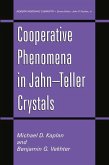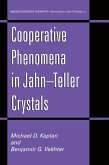Extractions of Metals from Soils and Waters represents a new emphasis in the series Modern Inorganic Chemistry, namely the impact inorganic chemistry can have on the environment. Also, this is the first volume ever to introduce the reader to all aspects of heavy metal extraction. While the primary emphasis is on complexation chemistry, attention is also paid to phase transfer aspects. Particular methods of note include electrokinetics, phytoremediation, and sensors. Aimed primarily at chemists, this book will also appeal to engineers, plant biochemists, environmental health specialists, and practitioners or students of environmental law.
`This packed volume will appeal broadly to professionals and students interested in the topic of extractive remediation of environmental media contaminated with toxic or radioactive metals. Whether one seeks information on applicable techniques, specific approaches to individual metal ions, or the chemistry of the myriad reagents that have been used, one will find up-to-date information together with numerous citations to detailed source literature. Written from the perspective of inorganic chemistry, the volume excels in describing the application of the principles of coordination chemistry. However, the treatment is sufficiently general as to serve as a handy reference in the fields of environmental chemistry, extractive metallurgy, analytical chemistry, and separations science and technology.'
Bruce A. Moyer, PhD, Oak Ridge, TN
`This third book by Max Roundhill in the "Modern Inorganic Chemistry" series provides a thoroughly competent treatment that will serve the needs of both researchers and users of the methods. As well as having a logical and systematic structure, the text is written in an easily readable style so that the contents can be assimilated quickly. The clear arrangement of the material according to the different methods and heavy metals will ensure that the above two groups of users can quickly find information on aspects of special interest. On one hand, by explaining the advantages and disadvantages of the various extraction methods it enables the user to make an informed choice, and also to choose the most suitable ligands, for example with regard to metal selectivity. The researcher, on the other hand, will be able to evaluate his or her own results (using different ligands or extraction methods) by comparing them with the results reported in the book. Thus, the author wisely decided to include not only methods that have already been tested in field trials, but also results from research on other interesting methods which are still only at the laboratory stage.'
Rainer Ludwig, Institut für Chemie, Freie Universität Berlin (Germany) in Angewandte Chemie Review in 2002
Bruce A. Moyer, PhD, Oak Ridge, TN
`This third book by Max Roundhill in the "Modern Inorganic Chemistry" series provides a thoroughly competent treatment that will serve the needs of both researchers and users of the methods. As well as having a logical and systematic structure, the text is written in an easily readable style so that the contents can be assimilated quickly. The clear arrangement of the material according to the different methods and heavy metals will ensure that the above two groups of users can quickly find information on aspects of special interest. On one hand, by explaining the advantages and disadvantages of the various extraction methods it enables the user to make an informed choice, and also to choose the most suitable ligands, for example with regard to metal selectivity. The researcher, on the other hand, will be able to evaluate his or her own results (using different ligands or extraction methods) by comparing them with the results reported in the book. Thus, the author wisely decided to include not only methods that have already been tested in field trials, but also results from research on other interesting methods which are still only at the laboratory stage.'
Rainer Ludwig, Institut für Chemie, Freie Universität Berlin (Germany) in Angewandte Chemie Review in 2002
`This packed volume will appeal broadly to professionals and students interested in the topic of extractive remediation of environmental media contaminated with toxic or radioactive metals. Whether one seeks information on applicable techniques, specific approaches to individual metal ions, or the chemistry of the myriad reagents that have been used, one will find up-to-date information together with numerous citations to detailed source literature. Written from the perspective of inorganic chemistry, the volume excels in describing the application of the principles of coordination chemistry. However, the treatment is sufficiently general as to serve as a handy reference in the fields of environmental chemistry, extractive metallurgy, analytical chemistry, and separations science and technology.' Bruce A. Moyer, PhD, Oak Ridge, TN `This third book by Max Roundhill in the "Modern Inorganic Chemistry" series provides a thoroughly competent treatment that will serve the needs of both researchers and users of the methods. As well as having a logical and systematic structure, the text is written in an easily readable style so that the contents can be assimilated quickly. The clear arrangement of the material according to the different methods and heavy metals will ensure that the above two groups of users can quickly find information on aspects of special interest. On one hand, by explaining the advantages and disadvantages of the various extraction methods it enables the user to make an informed choice, and also to choose the most suitable ligands, for example with regard to metal selectivity. The researcher, on the other hand, will be able to evaluate his or her own results (using different ligands or extraction methods) by comparing them with the results reported in the book. Thus, the author wisely decided to include not only methods that have already been tested in field trials, but also results from research on other interesting methods which are still only at the laboratory stage.' Rainer Ludwig, Institut für Chemie, Freie Universität Berlin (Germany) in Angewandte Chemie Review in 2002

